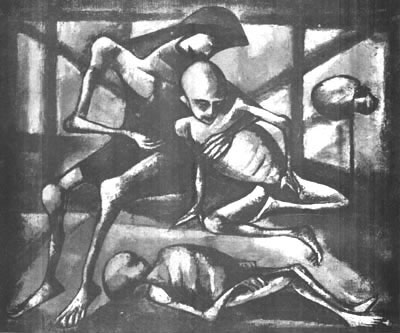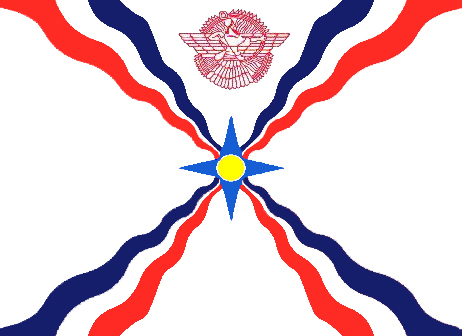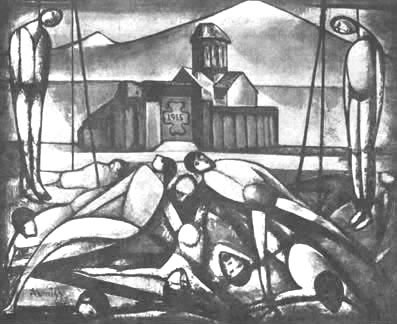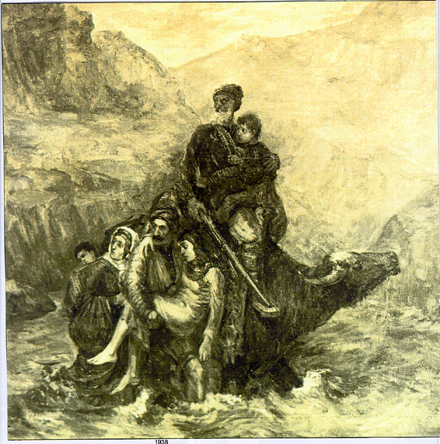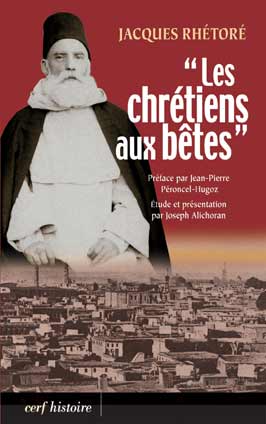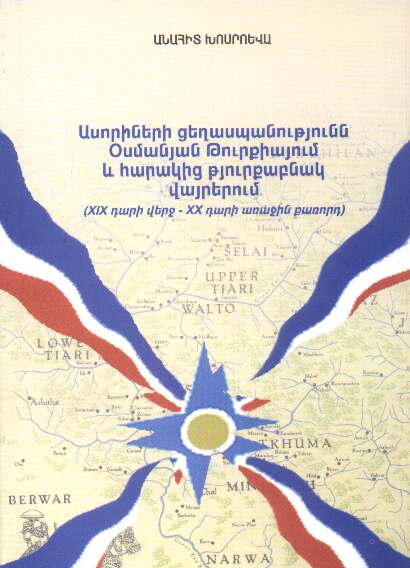Ninety Years Later
Dialogue Must Supersede Obsession
Motto
"Even the most ignorant nations are capable of appreciating the goodwill of a representative of a foreign power." [Cicero]
Hence, edging ahead with a dialogue, must forestall all else, including passion, and obsession.
Remembrance
The 90th year of remembrances of massacres and mayhem are upon us. Such inhumane deeds did not start with the year of 1915, nor did they end there. In its longest history of mankind, Assyria had gone through so many massacres and genocides, that the 365 days of the year might not suffice to commemorate them, and some days might have to doubled or quadrupled for commemorations.
The most devastating blow perpetrated against the Assyrians does not lay in the massacres of 1915, which reduced the entire population by almost a third. The fatal blow to the nation of Assyria was the 1933 Massacre of Semele and its aftermath.
That is when over 300,000 Assyrians, two-thirds of the population of Mosul, had to relinquish their legal and rightful land, the Province, and the City of Mosul, with a great number of fatalities, and to move away from their ancestral domain, to Syria, Iran and Russia. 'Mount Semele' [Kakovitch].
Losing relatives, neighbors, co-nationals and friends is a sobering effect. However, losing ancestral territory is another matter.
No one can bring back the victims by the heinous acts of their neighbors. Hence it is pre-eminently the territorial claim that must take precedence above all else.
That claim, that would nurture and ensure Assyria nation continuity in its pursuit of peaceful and cultural nationalism, has to be conducted without passion and compassion. Logic and perseverance is what counts now.
Logic
A delegation of selected Assyrian nationals throughout the world to meet face to face with the logic and its challenges is to be designated without debates and delays.
Assyria possesses some rather heavy thinkers, and ardent and savvy individuals that can carry a diplomatic feat in any capital of the world, and in particular with Armenia, Turkey, Iran, Iraq, Syria, Lebanon and Jordan.
These seven nations have been placed at the top of the list for their logistical presence, and pre-eminence, as well as the consequences an Autonomous Assyria in Northern Iraq might bear upon them.
Armenia
A diligent approach to the Government of Armenia - certainly not at arms length - to proceed with negotiations undertaken by an Assyrian of good offices, must be a priori case.
The diplomatic efforts conducted by Assyria ought to be, somewhat, within the leverage of the approval of the Government of Armenia. Such moves may not be parallel to the paths and policies of the Armenians however the approach of Assyria must not meet resistance in the Yerevan circles. A highly diligent and skilled diplomat with great tact might succeed.
With all intent of clarification, Armenia and Assyria are not equal, since one is a nation, and the other is striving to become one. Thus, a number of approaches shall separate our moves of tomorrow, but one. That one move is to forge ahead with a dialogue with Ankara.
Despite all ramifications and demonstrations, Armenia, as a sovereign nation does have an Embassy in Ankara, just as much as Ankara has one in Yerevan. There is obviously a dialogue going on between these two countries.
Hence, it is our turn to initiate such a dialogue, and to try to bring it to fruition.
Turkey
Turkey is a dominant factor in the Middle East, and its political scene. A pre-emptive offer to conduct a dialogue with Ankara must be second, only to that of Armenia. It is essential to clarify that negotiations with Ankara "Qui lo sa?", [who knows it?,] could turn out to be most vital venues in search to attain a national autonomy on our land.
Obviously most Assyrians do have factual horrid stories of their ancestors perishing at the hands of the Ottoman Empire, and some will not just let their passions overcome them. The following maxim "homo homini lupus" [man is a wolf for men], may not sit well with some politicians in Ankara, but whenever, we cease our exasperate slogans of justice and compassion, and reverse the course for a mutually beneficial contact they might want to listen to our laments.
The most we can convey to Ankara is to revise its stance on the World War I massacres, and to simply state that:
"The Ottoman Empire, while zealously defending its integral territory, did neglect overseeing the safety of its conquered nations, but, in wars, any wars, there are civilian fatalities, and, in most of these wars, such massacres are overlooked, if not sanctioned."
Assyria would accept this rendition on the massacres by the Ottoman Empire, and would not renege on its promises.
Iran
Teheran is perhaps just as a viable center for negotiations as Yerevan and Ankara.
No political move or decision shall escape the influence and the power Iran musters in the Middle East. Also, just like Turkey, being a neighbor to Iraq, and a good neighbor to Armenia, Teheran might provide some surprising results stemming from our negotiations with Iranian authorities.
Teheran, just like Ankara, Damascus, Beiruth and Amman, does not fear recrimination from a handful of non-Moslem Assyrians to conduct their own political, cultural and internal affairs in Northern Iraq. As a matter of fact the most sophisticated emblem for Assyria negotiators might be that being neutral among their Moslem neighbors, including the Kurds, Assyria might just become a pivotal peacemaker for all concerned.
Syria
Home to over 100,000 Assyrians, Syria has been hosting Assyrians with dignity and tolerance for the past six decades, ever since its independence from France. Syria, along with Turkey and Algeria, are the only Moslem dominated nations, with constitutionally secular modes of government.
With proper approach and gratitude Syria could be counted as a staunch supporter for Assyria cause, since this could stabilize the section of the Northern Iraq more so, than it is at the present time.
Lebanon
The less one dwells into the mega-political stature of the country of Lebanon, the better off one might be in the future endeavors with Beiruth.
It would be utterly irresponsible to take sides on a most complex of political machinations in Lebanon. And, especially most dangerous would be to side with the Christian political machine, at the expense of abandoning the Moslem side of it.
An intertwined and a sober policy is to be enacted and practiced to remain on the sidelines of the Lebanon's politics, and merely to look at them as, perhaps, mentors in our approach to sustain a non-Moslem national autonomy within the parameters of the Moslem Iraq.
Jordan
Being an absolute Kingdom, the Royal Court of the Hashemite Kingdom of Jordan could be an easier task to handle than all others.
One person in the country can make a solemn decision, and promise to stand by it. That person is the King Abdullah himself.
King Abdullah is a well educated and a dedicated political savvy. He is articulate and noble, and can muster a great deal of influence in most capitals of the world more so, than Teheran, Ankara or Damascus can.
Iraq
In Baghdad, Assyria has to convert itself to a multitude of ways of diplomacy. While dealing with Baghdad, one must contend that there are three separate elements that have to be coalesced and agreed upon any arrangements that can come out of negotiations with the Government of Iraq.
Shi'a: -- The most predominant of the three factions controlling Iraq, Shi'a are somewhat similar to deal with as negotiating with Jordan.
Being extremely devoted religious sectarians, Shi'a have proven to be able to tolerate all nationalities and all faiths since the inception of Islam. The credence, respect and authority the Shi'a place in the hands of Grand Ayatollah Al-Sistani, is not coincidental scheme or personal cult of political nature. Shi'a diligently are faithful, and shall remain so for any designated Grand Ayatollah of their country, just like post-revolution Iran was and still is, to their Grand Ayatollahs.
Sunni: -- The standard bearer for the past seven decades, ever since the creation of Iraq, the Sunni population of Iraq differs from that of the Shi'a.
Although strong believers in their faith and their sectarian religion, the Sunni are less adamant to follow their sectarian hierarchy on the political scene than the Shi'a. In other words, the Sunni have become more astute politicians, since they do supersede all other factions of Iraq in experience and practice.
The Sunni are not an uncomfortable sectarian entity to live with. They had proven that by including a non-Moslem, an Assyrian of Chaldean faith, at the helm of their leadership for three decades, by handing him the second most important position of the land.
Somewhat subdued, at the present, the Sunni would like to partake in the affairs of Iraq on an equal partnership leverage, with both the Shi'a and the Kurds.
It will be a great task for Assyria to ensure that the Sunni include Assyria in retrospect, among its equal partners of Shi'a, the Kurds, and the Assyrians.
Kurds: -- One of the beastliest crimes committed against a nation in the 20th century is the crime perpetrated against the Kurds.
How can nations of the world, with all their humane, political and sociological organizations, ostracize a nation of some 25 million?
Rummaging through the Codes and Regulatory Commission Files of the defunct League of Nations, as well as the United Nations, there is absolutely not a single clause that should prevent the Kurds from being recognized as a nation.
The same goes for Assyria.
The only reason Kurds have not been able - at press time - to attain statehood, was fear of igniting political upheavals in the Middle East. Since the Kurds reside in Azerbaijan [Nakhijevan], Turkey, Iran, Iraq, and Syria, the United Nations Political Secretariat has been neglecting its duties of the rights of man, by employing the Napoleonic adage: "Ne la réveillez pas", [do not awaken her], referring to China of early 19th century.
Well, the Kurds have been awake for six decades now, ever since, with the aiding and abetting of the Soviet Union right after WWII, a Kurdistan with the central focal point of Mahabad, in Northwestern Iran, was created. Obviously, that government being pro-Communist -- as a payoff -- was overthrown, and ever since, the Kurds were warring one country or another, one government or another, at one time or another.
Resolution
The immediate formation of a Diplomatic Echelon is only a part of the Government for Assyria. This branch of Governing Body is to conduct negotiations with Teheran, Yerevan, Ankara, Baghdad, Damascus, Beiruth and Amman. At a latter date, such good offices shall be offered to Moscow as well, since Russia is trying to exercise its authority throughout the Middle East, once again.
Known simply as a 'Lobby', and in this case, an 'International Lobby', this phase was presented to the Delegates of the 2004 San Jose Convention of the Assyrian American National Federation, in its entirety. (See Interim Committee for Government of Assyria --ICGA, in Zijnda Archives), [Ibid.].
The selection of personnel to handle the tasks is based on their credentials, and, at press time, no one is suited better, to obtain results, if any, than the ones placed for recommendation. This is a diversionary path from democratic procedures of electing personnel by international suffrage, however, since the events are turning around at such a rapid stance, we shall have to forestall this most necessary of preconditions at this junction, and implement it for the creation of the other branches of Government of Assyria, in the future.
The individuals recommended are savvy, honest, capable, and -- we hope -- willing to accept such responsibilities.
o Yonadan Bet-Kolia, the Assyrian and Chaldean representative at the Iranian Majlis [Parliament] to be commissioned and recognized as Plenipotentiary [diplomatic agent] to Teheran;
o Mr. Yonadam Kanna, Assyrian Representative in the Iraq Legislature, to be burdened with double tasks, to Baghdad and Amman;
o Mr. Ashur Giwargis, an author, and a correspondent, to Beiruth and Damascus;
o Dr. Eden Naby, of Harward University, to Yerevan;
o Francis Sargis, Esq., to Ankara;
o The AANF is to provide all the expenses toward these missions sans proviso;
o All plenipotentiary designates are to select a Liaison Officer to whom they will be submitting their confidential reports;
o These reports are to be studied and analyzed at intervals no longer than 90 days;
o Contents and resolutions of these reports are to be made public thereafter;
o Should any of the individuals above turn down these obligations, they are free to make their own recommendations, so that their nominees could be matched against the ones available on the list of other candidates;
o Should any of the above candidates accept these positions, it would be imperative to present themselves as Plenipotentiary Pro-Tempore for the Government of Assyria;
o To deal with foreign Governments and their Foreign Affairs dignitaries, one must conduct negotiations on a quid pro quo basis.
Ultimate Resolution
All correspondence and approaches by individuals or single party affiliates with any branches of foreign governments of the world are unaided, unattached, unproductive, unacquainted, unadorned, ungratified, undignified, and unacceptable, thus, unrecognizable.
All work needs to be conducted within a framework, and that framework is Government, when dealing with Governments.
Assyria is under no circumstances to join ranks with any league of any sort.
(All communication pertaining to the above clauses shall remain confidential until it has been fully presented, discussed and analyzed by the authorized representatives).
Please submit all correspondence and other information to:
Interim Committee for the Government of Assyria (I.C.G.A.).
I.C.G.A., POB 3256, Cypress, CA 90630, USA.
e-Mail: Appeal2Youth@zindamagazine.com
|
